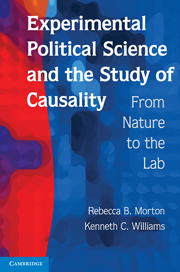Crossref Citations
This Book has been
cited by the following publications. This list is generated based on data provided by Crossref.
Hansen, Jared M.
and
Walden, Eric A.
2008.
Ethical and Legal Awareness in Unauthorized Downloading of Intellectual Property: The Role of Restrictedness of Use.
SSRN Electronic Journal,
Faas, Thorsten
and
Huber, Sascha
2010.
Experimente in der Politikwissenschaft: Vom Mauerblümchen zum Mainstream.
Politische Vierteljahresschrift,
Vol. 51,
Issue. 4,
p.
721.
VAN DE WALLE, STEVEN
and
VAN RYZIN, GREGG G.
2011.
THE ORDER OF QUESTIONS IN A SURVEY ON CITIZEN SATISFACTION WITH PUBLIC SERVICES: LESSONS FROM A SPLIT‐BALLOT EXPERIMENT.
Public Administration,
Vol. 89,
Issue. 4,
p.
1436.
SIRIN, CIGDEM V.
and
VILLALOBOS, JOSÉ D.
2011.
Where Does the Buck Stop? Applying Attribution Theory to Examine Public Appraisals of the President.
Presidential Studies Quarterly,
Vol. 41,
Issue. 2,
p.
334.
Dickson, Eric S.
2011.
Cambridge Handbook of Experimental Political Science.
p.
58.
Richardson, Elizabeth
and
John, Peter
2011.
Who Listens to the Grassroots? A Field Experiment on Informational Lobbying in the UK.
SSRN Electronic Journal,
Morton, Rebecca B.
and
Williams, Kenneth C.
2011.
Cambridge Handbook of Experimental Political Science.
p.
369.
Oldmixon, Elizabeth
Calfano, Brian
and
Suiter, Jane
2011.
Clergy as Political Elites.
SSRN Electronic Journal,
Druckman, James N.
Green, Donald P.
Kuklinski, James H.
and
Lupia, Arthur
2011.
Cambridge Handbook of Experimental Political Science.
p.
3.
Druckman, James N.
Green, Donald P.
Kuklinski, James H.
and
Lupia, Arthur
2011.
Cambridge Handbook of Experimental Political Science.
p.
15.
Imai, Kosuke
and
Strauss, Aaron
2011.
Estimation of Heterogeneous Treatment Effects from Randomized Experiments, with Application to the Optimal Planning of the Get-Out-the-Vote Campaign.
Political Analysis,
Vol. 19,
Issue. 1,
p.
1.
Margetts, Helen Z.
2011.
Experiments for Public Management Research.
Public Management Review,
Vol. 13,
Issue. 2,
p.
189.
Tingley, Dustin H.
2011.
The Dark Side of the Future: An Experimental Test of Commitment Problems in Bargaining1.
International Studies Quarterly,
Vol. 55,
Issue. 2,
p.
521.
Sirin, Cigdem V
2011.
Examining the effects of political information and intervention stages on public support for military interventions: A panel experiment.
Acta Politica,
Vol. 46,
Issue. 3,
p.
261.
Hamenstädt, Ulrich
2012.
Jahrbuch für Handlungs- und Entscheidungstheorie.
p.
105.
Kittel, Bernhard
and
Luhan, Wolfgang J.
2012.
Experimental Political Science.
p.
263.
Shineman, Victoria
2012.
Isolating the Effect of Compulsory Voting Laws on Political Sophistication: Exploiting Intra-National Variation in Mandatory Voting Laws between the Austrian Provinces.
SSRN Electronic Journal,
Bédard, Pierre‐Olivier
and
Ouimet, Mathieu
2012.
Cognizance and Consultation of Randomized Controlled Trials among Ministerial Policy Analysts.
Review of Policy Research,
Vol. 29,
Issue. 5,
p.
625.
HUBER, GREGORY A.
HILL, SETH J.
and
LENZ, GABRIEL S.
2012.
Sources of Bias in Retrospective Decision Making: Experimental Evidence on Voters’ Limitations in Controlling Incumbents.
American Political Science Review,
Vol. 106,
Issue. 4,
p.
720.
Morton, Rebecca B.
and
Williams, Kenneth C.
2012.
Jahrbuch für Handlungs- und Entscheidungstheorie.
p.
13.





